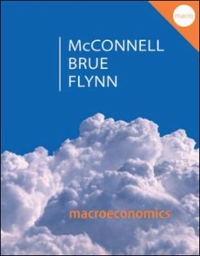Question
If the marginal propensity to consume is .6, what is the multiplier of fiscal stimulus? Question 1 options: 6 0.6 1.2 2.5 Question 2(4 points)
If the marginal propensity to consume is .6, what is the multiplier of fiscal stimulus?
Question 1 options:
6
0.6
1.2
2.5
Question 2(4 points)
Suppose a government ignores calls to balance the budget during a recession (austerity policy) and instead increases government spending. According to the textbook analysis, this will likely:
Question 2 options:
dampen the recession
there is no way of knowing
have no effect on the recession
amplify the recession
Question 3(4 points)
Which of the following does the textbooknotconsider a government policy failure during the Great Depression?
Question 3 options:
Raising interest rates.
New Deal Infrastructure Policies
Attempting to balance the budget (austerity).
Failing to combat the fall in prices.
Question 4(4 points)
In the U.S., a major way the Federal Reserve influences the prevailing interest rate is:
Question 4 options:
fiscal policy
that is the job of the Treasury, not the Federal Reserve.
the buying and selling of government bonds
printing money
Question 5(4 points)
According to chapter 14 (and John Maynard Keynes) a recession is a good time for the government to:
(select all that apply). Multiple answers
Question 5 options:
start large public infrastructure projects.
cut unemployment benefits.
cut taxes.
start combating the budget deficit.
Question 6(4 points)
What is private investment (firms buying capital goods) dependent on?
Question 6 options:
Current levels of output
Expectations of fiscal policy multiplier effects
Current government spending
Expectations of future profit
Question 7(4 points)
In a inflationary climate, the average consumer would:
(select all that apply)
Question 7 options:
spend more today because goods will be more expensive tomorrow.
decrease spending because goods are cheaper today.
decrease savings, since the value of their savings will decrease more than normal.
increase savings, since the value of their savings will increase more than normal.
Question 8(4 points)
All else held equal, a lower interest rate...
Question 8 options:
decreases the cost of borrowing and decreases consumption.
decreases the cost of borrowing and increases consumption.
increases the cost of borrowing and increases consumption.
increases the cost of borrowing and decreases consumption.
Question 9(4 points)
A decrease in the Marginal Propensity to Import:
Question 9 options:
not enough information
decreases the multiplier
causes no change to the multiplier
increases the multiplier
Question 10(4 points)
Let's say there is a tax-cut on taxes primarily paid by those with higherincomes during an expansion. The multiplier of this fiscal stimulus is likely to be
Question 10 options:
greater than 1
greater than 1 but less than 10
exactly 1
less than 1
Question 11(4 points)
An decrease in taxes (select all that apply):
Question 11 options: Multiple answers
would be considered expansionary monetary policy
would deter economic growth
increases the multiplier
would be considered expansionary fiscal policy
Question 12(4 points)
Interest rates affect (select multiple):
Question 12 options: multiple answers
The level of inflation
Asset Prices
Exchange Rates
None of the above
Question 13(4 points)
A situation where the rate of inflation is negative is called:
Question 13 options:
deflation
disinflation
hyperinflation
stagflation
Question 14(4 points)
The goal of public policy in the realm of innovation is (in part) to strike a balance between:
Question 14 options:
economic growth and unemployment
incentivizing innovation and allowing for diffusion
subsidizing large firms and monetary controls
none of the above
Question 15(4 points)
The textbook points to ________ as a major cause of the Great Recession.
Question 15 options:
the decrease in power of unions
financial deregulation
Keynesian Economics
the oil crisis
Step by Step Solution
There are 3 Steps involved in it
Step: 1

Get Instant Access to Expert-Tailored Solutions
See step-by-step solutions with expert insights and AI powered tools for academic success
Step: 2

Step: 3

Ace Your Homework with AI
Get the answers you need in no time with our AI-driven, step-by-step assistance
Get Started


